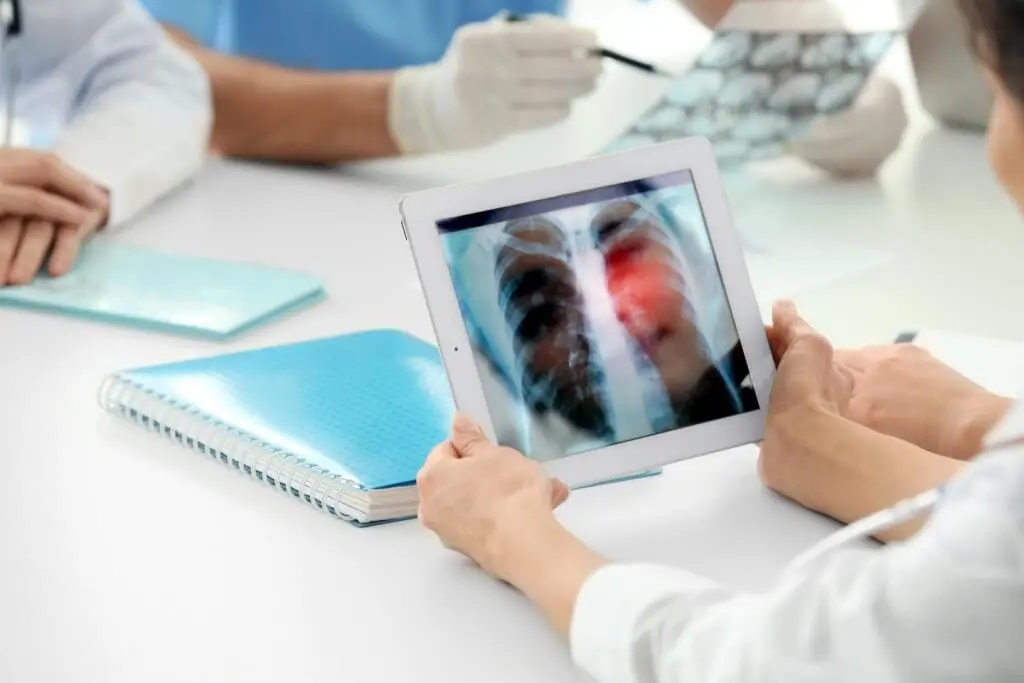Share This Article
Whether lung cancer can be cured or not is a question that is still difficult to answer directly. The success or failure of curing cancer generally depends on how early the disease can be detected and the health problems that accompany it.
Not only that, the cure for lung cancer at each stage is also different, depending on the severity. So, to find out more about whether lung cancer can be cured, let’s look at the following explanation.
Can lung cancer be cured?
Reporting from Very Well Health, there is always the possibility that lung cancer can recur many years later. Because of this, many doctors say that lung cancer is never truly cured.
Being free from lung cancer does not mean you have been cured of the disease. However, the longer a person lives without evidence of cancer or NED, the less likely they are to see the cancer return.
Lung cancer is similar to other solid tumors in that long-term remission is possible so doctors are hesitant to say if it can be cured. The term remission itself is applied to cancer patients who have undergone therapy and have been evaluated.
Exception to cure for lung cancer
There is one exception, namely people who recover from stage 1A lung cancer without vascular invasion. This condition means the tumor is very small and does not spread to the blood vessels or lymph nodes before going into remission.
In this type of early-stage non-small cell lung cancer or NSCLC, surgery offers the best chance of long-term survival.
After surgery, if there is no evidence of cancer after five years then the doctor may use the word cured to describe the health status.
Stages of lung cancer
What is lung cancer can be recovered can be known through the stages. The cancer stage shows how far the cancer has spread and helps guide treatment.
The chance of successful or curative treatment is much higher when diagnosed and treated at an early stage.
Lung cancer does not cause obvious symptoms in its early stages so the diagnosis often comes after it has spread. Non-small cell lung cancer has four main stages, namely as follows:
- Stage 1: Cancer is found in the lungs, but has not spread outside the lungs.
- For Stage 2: Cancer is found in the lungs and nearby lymph nodes.
- Stage 3: Cancer is found in the lungs and lymph nodes in the middle of the chest.
- At Stage 3A: Cancer is found in the lymph nodes, but only on the same side of the chest where the cancer first started growing.
- Stage 3B: The cancer has spread to the lymph nodes on the opposite side of the chest or to the lymph nodes above the collarbone.
- Stage 4: The cancer has spread to both lungs, to areas around the lungs, or to distant organs.
How is lung cancer treated?
Treatment for non-small cell lung cancer or NSCLC varies from person to person. Cancer recovery depends on many things, including specific health details. Several types of treatment are based on the stage of the disease, including:
- Stage 1 NSCLC. Surgery to remove part of the lung may be needed. Chemotherapy may also be recommended, especially if you are at high risk of recurrence.
- Stage 2 NSCLC. People with this stage of cancer may need surgery to remove part or all of the lung. Apart from that, chemotherapy will usually also be recommended.
- NSCLC Stage 3. Treatment for this stage of cancer generally requires a combination of chemotherapy, surgery, and radiation treatment.
- Stage 4 NSCLC. This type of stage is very difficult to cure. However, there are treatment options, namely surgery, radiation, chemotherapy, targeted therapy and immunotherapy.
Options for small cell lung cancer also include surgery, chemotherapy, and radiation therapy. In most cases, the disease will be too advanced to require surgery. Clinical trials may be needed to provide access to new treatments.
Some people with advanced lung cancer choose not to continue treatment. However, you can still choose palliative care, which focuses on treating the symptoms of cancer rather than the cancer itself.
Make sure to check your and your family’s health regularly through Good Doctor, a 24/7 service. Take care of your and your family’s health with regular consultations with our doctor partners. Download the Good Doctor application now, click this link, yes!


